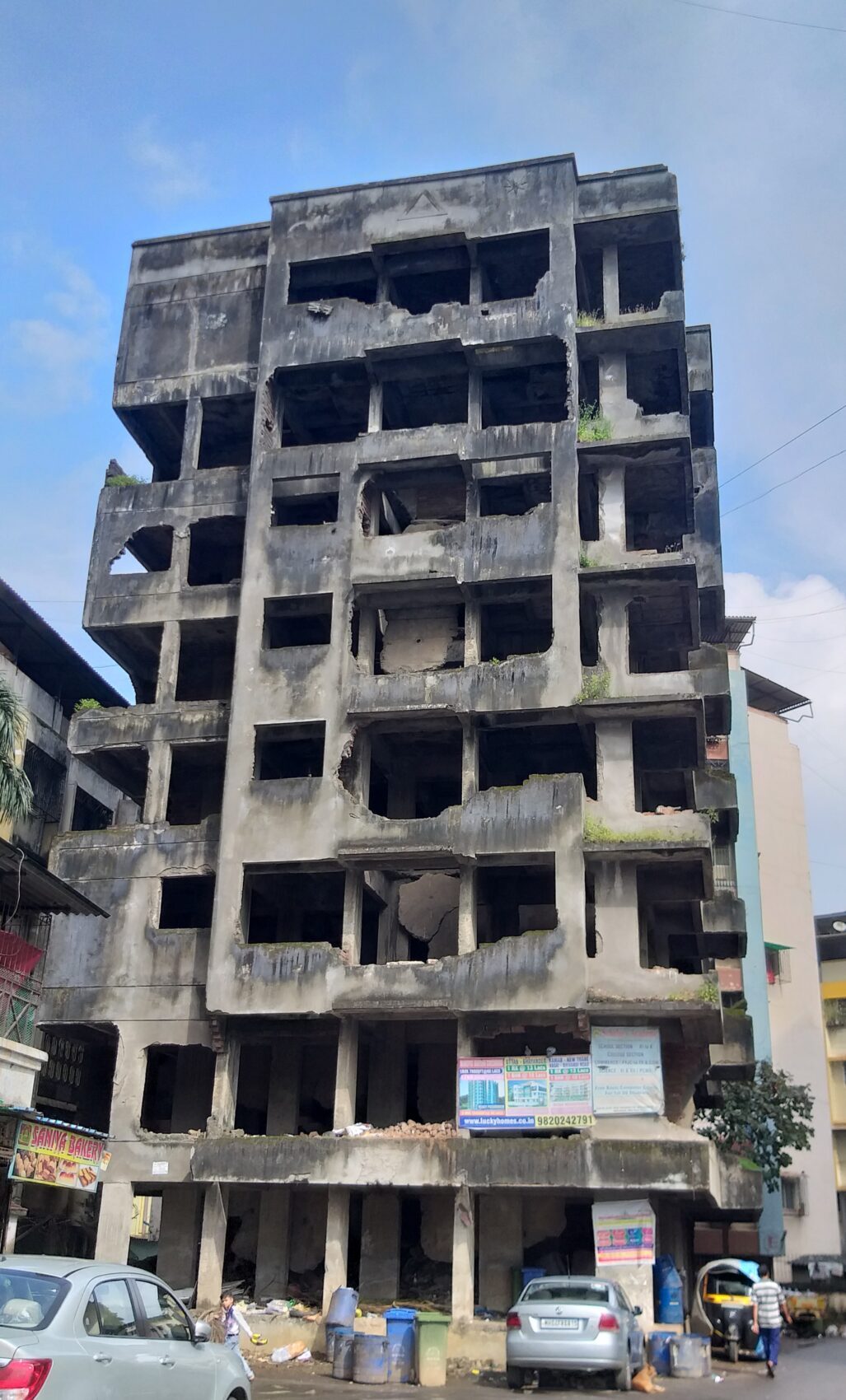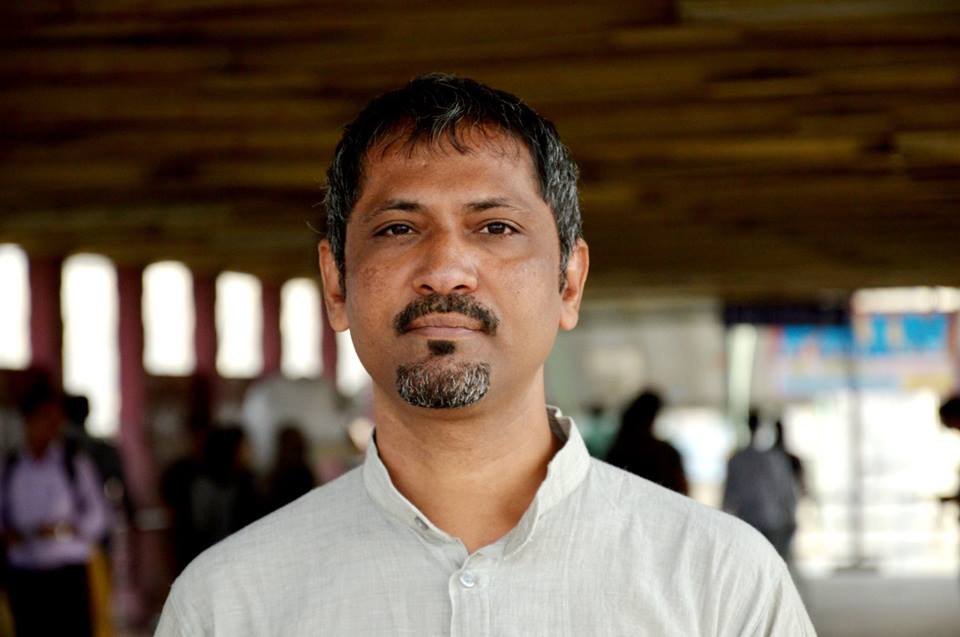Illegal Residents in Illegal Buildings
Next to my house, there has been a ghostlike tall construction for many years, because the local administration has declared it illegal and has demolished its windowpanes and pillars. By now, cats and dogs have taken refuge in the dilapidated building. Next to this ghostlike structure there is another illegal construction, but it is more fortunate, as the municipal corporation has not destroyed it inside. Certainly, the corrupt officials have been working in obscurity. This illegal building is on the main road, so there are a dozen shops in it. A few shops are officially approved but nobody checks the permission of those who run the shops. It is astonishing that one shop has hosted a branch of local police force for a few years.
More than two dozen miserable families live in this illegal structure, mostly interstate migrants from West Bengal. Each apartment is shared by two or three families; one family in the living room, one in the kitchen and another one in the bedroom. Together, they pay their rent either to the builder or the local mafia. My two maids witness the horrors of living in such buildings every day. They don’t have water supply. They are supplied electricity only at night, and only illegally. If an accident or a crime took place, they would be denied the assistance from the local police. It seems that the poor interstate migrants are living under similar dismal conditions in all major Indian cities. They are abandoned by the government. They do exist, but everybody seems to deny their existence.
Currently, India is governed by the pro-Hindutva Bharatiya Janata Party (BJP), which is known for following a racial ideology. Its leaders advocate a racist and anti-minorities program. In addition, the government has declared 1.9 million citizens illegal immigrants in the controversial National Register of Citizen (NRC) in the northern state Assam. People had to prove that they and their forefathers were born in India. A large number of them have been declared illegal on the basis of evident misspellings in their documents.
How are those without access to drinking water, electricity, education, or those who have no house of their own or a drug cabinet, supposed to show their forefathers’ documents in order to prove their nationality? They will probably find themselves in detention camps sooner or later, but a detention camp in a democracy seems like an illegal ghostlike building.
Editing: Juliane Schallau
Die illegalen Bewohner illegaler Gebäude
Seit vielen Jahren steht ein großer, gespenstischer Bau bei mir nebenan, denn die Regierung hat ihn für illegal erklärt und die Fensterscheiben und Säulen zerstört. Mittlerweile haben Hunde und Katzen in dem zerfallenen Gebäude Zuflucht gefunden. Neben diesem gespenstischen Bauwerk befindet sich ein weiterer illegaler Bau, der allerdings von der Zerstörung verschont geblieben ist. Mit Sicherheit haben die korrupten Beamten im Verborgenen gearbeitet. Dieses illegale Gebäude befindet sich auf der Hauptstraße, und folglich gibt es Dutzende Geschäfte. Einige sind offiziell genehmigt, doch niemand überprüft die Genehmigungen der Betreiber. Erstaunlicherweise wurde eines dieser Geschäfte ein paar Jahre lang als Niederlassung der örtlichen Polizei genutzt.
Mehr als zwei Dutzend unglückliche Familien leben in diesem illegalen Bauwerk, die meisten von ihnen sind Migranten aus Westbengalen. In jedem Apartment leben zwei oder drei Familien – eine im Wohnzimmer, eine in der Küche, eine andere im Schlafzimmer. Gemeinsam zahlen sie die Miete, entweder an den Bauherren oder die örtliche Mafia. Meine beiden Hausangestellten durchleben dieses Grauen jeden Tag. Sie haben keine Wasserversorgung. Die Elektrizitätsversorgung funktioniert nur nachts, und ausschließlich illegal. Im Falle eines Unfalls oder eines Verbrechens würde ihnen die Polizei jegliche Hilfe verweigern. Scheinbar leben alle armen Migranten in den indischen Großstädten unter den gleichen trostlosen Bedingungen. Die Regierung kümmert sich nicht um sie. Sie existieren zwar, doch scheint jedermann ihre Existenz zu leugnen.
Gegenwärtig wird Indien von der hindutvafreundlichen Bharatiya Janata Party (BJP) regiert, die bekannt für ihre Rassenideologie ist. Die Parteispitze befürwortet ein rassistisches und minderheitenfeindliches Parteiprogramm. Darüber hinaus hat die Regierung im Rahmen des umstrittenen Staatbürgerregisters (NRC) 1,9 Millionen Bürgerinnen und Bürger im nördlich gelegenen Bundesstaat Assam zu illegalen Einwanderern erklärt. Die Menschen mussten nachweisen, dass sowohl sie als auch ihre Vorfahren in Indien geboren wurden. Viele von ihnen wurden schließlich aufgrund von offensichtlichen Rechtschreibfehlern in ihren Dokumenten zu Illegalen erklärt.
Wie sollen jene ohne Zugang zu Trinkwasser, Elektrizität, Bildung, jene die kein Haus und nicht einmal einen Medikamentenschrank haben, die Ausweispapiere ihrer Vorfahren vorweisen, um ihre Staatsangehörigkeit zu belegen? Früher oder später werden sie sich wahrscheinlich in Internierungslagern wiederfinden. Doch ein Internierungslager in einer Demokratie ist im Grunde ein gespenstisches illegales Gebäude.
Übersetzung: Juliane Schallau
अवैध इमारतों में रहने वाले अवैध लोग
मेरे घर के बगल में, कई सालों तक एक लम्बी निर्माणाधीन इमारत रही है जो किसी भूत की तरह दिखाई पड़ती थी। दरअसल, स्थानीय प्रशासन ने इसे अवैध घोषित कर दिया और मकान की खिड़की के शीशों और खंभों को ध्वस्त कर दिया था। अब तक, उस जर्जर इमारत में बिल्लियों और कुत्तों ने शरण ले लिया है। इस भूत की तरह दिखने वाली निर्माणाधीन इमारत के साथ ही, एक और अवैध ढांचा है लेकिन अच्छी बात यह है कि इसे अभी तक नगर निगम ने अंदर से ध्वस्त नहीं किया है। इससे पता चलता है कि भ्रष्ट अधिकारी अस्पष्टता में काम कर रहे हैं। यह अवैध ढांचा मुख्य सड़क पर है, इसलिए इसमें दर्जन भर दुकानें भी हैं। कुछ दुकानें आधिकारिक तौर पर स्वीकृत हैं लेकिन बाक़ी दुकानों की अनुमति-पत्र कोई जाँच नहीं करता। यह चौंकाने वाली बात है कि एक दुकान ने कुछ सालों तक स्थानीय पुलिस बल की एक शाखा की मेज़बानी भी की।
इस अवैध ढांचे में दो दर्जन से अधिक ग़रीब परिवार रहते हैं, जिनमें अधिकतर पश्चिम बंगाल के अंतरराज्यीय प्रवासी हैं। हर अपार्टमेंट में दो या तीन परिवार रहते हैं। एक परिवार लिविंग रूम में, दूसरा किचन में और तीसरा बेडरूम में। ये सब, या तो बिल्डर को या फिर स्थानीय माफिया को साथ में मिलकर किराया देते हैं। मेरे यहाँ काम करने वाली दो नौकरानियों ने ऐसी इमारतों में रहने की भयावहता देखी हैं। उनके पास पानी की सुविधा नहीं है। बिजली सिर्फ़ रात को मिलती है, वो भी अवैध रूप से। अगर कोई दुर्घटना हुई या अपराध हुआ, तो उन्हें स्थानीय पुलिस से सहायता भी नहीं मिल पाएगी। ऐसा लगता है कि ग़रीब अंतरराज्यीय प्रवासी सभी प्रमुख भारतीय शहरों में ऐसे ही निराशाजनक परिस्थितियों में रह रहे हैं। सरकार भी उनका ध्यान नहीं रखती। वे लोग हैं, लेकिन उनके होने को हर कोई नकारता है।
इस समय, भारत में हिंदुत्व को समर्थन करने वाली भारतीय जनता पार्टी का शासन है जो अपने जातीय विचारधारा को अनुसरण करने के लिए जानी जाती है। इसके नेता जातिवाद और अल्पसंख्यक विरोधी कार्यक्रम की वकालत करते हैं। इतना ही नहीं, सरकार ने उत्तरी राज्य असम में विवादास्पद नेशनल रजिस्टर ऑफ सिटीज़न (NRC) के तहत 1.9 मिलियन नागरिकों को अवैध प्रवासी घोषित किया है। लोगों को यह साबित करना था कि वे और उनके पूर्वज भारत में पैदा हुए। एक बड़ी संख्या है जिन्हें अवैध घोषित कर दिया गया, क्यूँकि उनके दस्तावेजों में नाम की स्पेलिंग ग़लत लिखी थी।
जिन लोगों के पास पीने का पानी, बिजली, शिक्षा वग़ैरह की सुविधा नहीं है, जिनके पास अपना घर या दवाओं की सुविधा नहीं है, वे अपनी राष्ट्रीयता साबित करने के लिए अपने पूर्वजों के दस्तावेज कहाँ से लाएँगे? ऐसे लोग आज नहीं तो कल ख़ुद को किसी नज़रबंद शिविरों में पाएँगे, लेकिन लोकतंत्र में नजरबंद शिविर वैसा ही है जैसे कोई भूत की तरह दिखाई पड़ने वाली अवैध इमारत।
अनुवाद: त्रिपुरारि
Share












